
“Latin American Labor at a Crossroads: Obstacles and Opportunities in Times of Change”
April 13-14, 2023
Center for Global Workers’ Rights
Dr. Mark Anner Center Director, Center for Global Workers’ Rights
EMAIL: cgwr@psu.edu PHONE: +1 814-865-5425 FAX: +1 814-867-4169Since July 2023, Professor Elaine Hui is the new Director of the Master of Professional Studies (MPS) in Labor and Global Workers’ Rights (LGWR). She has been teaching “Labor and Employment Relations in China in Comparative Perspective” since 2016. She shares with us some of her thoughts as the new Director of MPS in the LGWR program.
A former trade union organizer in Hong Kong and an alum of the Global Labor University (GLU), I am no stranger to labor rights and global labor movements. My research interests include labor resistance, trade unions, civil society, critical state theories, China, Chinese investment overseas, and Vietnam. After completing my doctorate degree from the University of Kassel in Germany, it was a pleasure for me to become a LGWR faculty and I started teaching in the program in 2016. With honor and excitement, I took over the position of the Director of the LGWR program from my beloved colleague, Mark Anner, in July 2023.

The LGWR program is unique in nature. Few, if any, labor programs in the US universities provide tuition waivers and stipends to labor activists across the globe to study global workers’ rights. Having built a solid network among labor activist alumni that are spread across many countries, the LGWR program is more than an academic program. It is part of the GLU, which is “rooted in the partnership of trade unions, universities, the ILO (International Labour Organization) and labour support organisations across the world.” Through the LGWR program and GLU, our students and alumni obtain both intellectual and practical movement resources and become part of the mobilizing structure that is critical for strengthening global labor movements.
Taking advantage of the great foundation laid by my predecessor, I hope to continue attracting committed labor activists to apply for the LGWR program, consolidating the interconnections among alumni and integrating our students and alumni into the global labor movement networks associated with the GLU. With the tremendous support from the College of Liberal Arts and the School of Labor and Employment Relations in Penn State, as well as with the dedication and commitment of the LGWR faculty, I believe the LGWR program will continue to grow and accomplish the above-stated goals to the fullest.
Learn more about the LGWR Program.
Union leaders and academics from five different countries (Argentina, Brazil, Colombia, Mexico, and the United States) analyzed the potential and challenges for the Latin American labor movement. The Symposium booklet and speakers’ notes are available here.
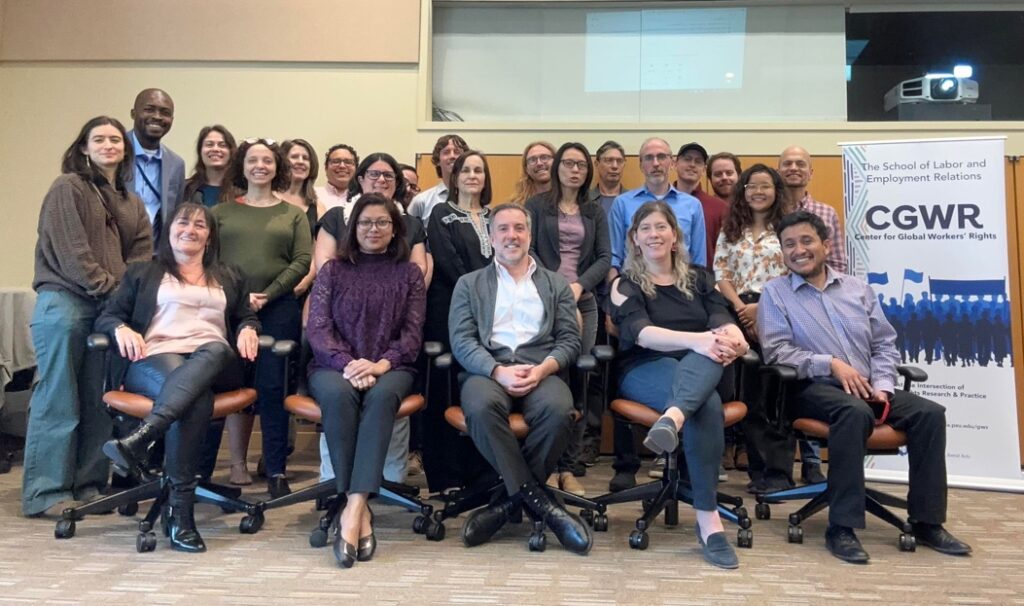
The CGWR has been active in 2023, carrying out work with the support of two significant grants. The first grant is from the U.S. Department of Labor. The aim of the grant is to develop a robust definition of worker voice and establish a mechanism for its study. Seven case studies provide the core of the research projects with contributions from several CGWR faculty and LGWR alumni. Center Director Mark Anner is the primary investigator for this grant and is working closely with Assistant Research Professor Matthew Fischer-Daly. They are working on a report, tentatively titled, “Worker Voice, What it is, What it isn’t, and Why it matters.” The report will be launch at the end of this year. GWR alumni, Sifat Amita and Ye Yint, and CGWR Assistant Professor Katherine Maich contributed case studies on enforceable brand agreements, worker voice under the authoritarian regime of Myanmar, and domestic workers, respectively.
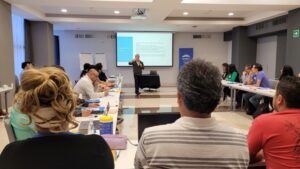 The second grant comes to the Center thanks to the generous support of the Solidarity Center’s Mexico office. The goal of the grant is to provide training and support for “worker-driven co-research” in global supply chains. This methodology combines strategic, corporate research with the active participation of workers in its design, implementation, analysis, and dissemination. Mark Anner is the primary investigator for this grant. Anner and Fischer-Daly are conducting research and providing training in northern and north central Mexico in the auto parts, apparel, and light manufacturing sectors. Training of trainers on the research methodology has also been provided in Mexico City in close coordination with the research and organizing staff of the AFL-CIO Solidarity Center’s Mexico office.
The second grant comes to the Center thanks to the generous support of the Solidarity Center’s Mexico office. The goal of the grant is to provide training and support for “worker-driven co-research” in global supply chains. This methodology combines strategic, corporate research with the active participation of workers in its design, implementation, analysis, and dissemination. Mark Anner is the primary investigator for this grant. Anner and Fischer-Daly are conducting research and providing training in northern and north central Mexico in the auto parts, apparel, and light manufacturing sectors. Training of trainers on the research methodology has also been provided in Mexico City in close coordination with the research and organizing staff of the AFL-CIO Solidarity Center’s Mexico office.
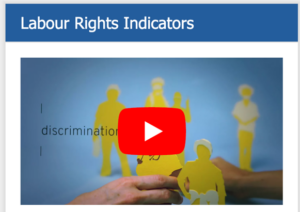 The Labour Rights Indicators (LRIs) is one of the premier databases with regard to respect for workers’ rights in the global economy. The LRIs methodology has provided the foundation for measuring United Nations Sustainable Development Goal 8.8 to protect labor rights and promote safe and secure working environments for all workers. The LRIs code 108 violation types, in law and practice, based on eight sources and provide the textual sources for coding. The LRIs code 108 types of worker rights violations and provide data and text sources on country-level compliance with freedom of association and collective bargaining rights based on eight sources of information (e.g., International Labour Organization findings, International Trade Union Confederation annual trade union survey, etc.). In September 2023, the CGWR added to its database three additional years to the database: 2018, 2019, and 2020. This means that we have data on worker rights violations around the world from 2012 until 2020. The LRIs database is open access.
The Labour Rights Indicators (LRIs) is one of the premier databases with regard to respect for workers’ rights in the global economy. The LRIs methodology has provided the foundation for measuring United Nations Sustainable Development Goal 8.8 to protect labor rights and promote safe and secure working environments for all workers. The LRIs code 108 violation types, in law and practice, based on eight sources and provide the textual sources for coding. The LRIs code 108 types of worker rights violations and provide data and text sources on country-level compliance with freedom of association and collective bargaining rights based on eight sources of information (e.g., International Labour Organization findings, International Trade Union Confederation annual trade union survey, etc.). In September 2023, the CGWR added to its database three additional years to the database: 2018, 2019, and 2020. This means that we have data on worker rights violations around the world from 2012 until 2020. The LRIs database is open access.
The faculty of the LGWR program and staff of the School of Labor and Employment Relations would like to extend our sincere congratulations to this year’s graduating class: Akufuna Mwauluka (Zambia), Keegan Conrad (USA), Ye Yint (Myanmar), and Sifat Amita (Bangladesh).
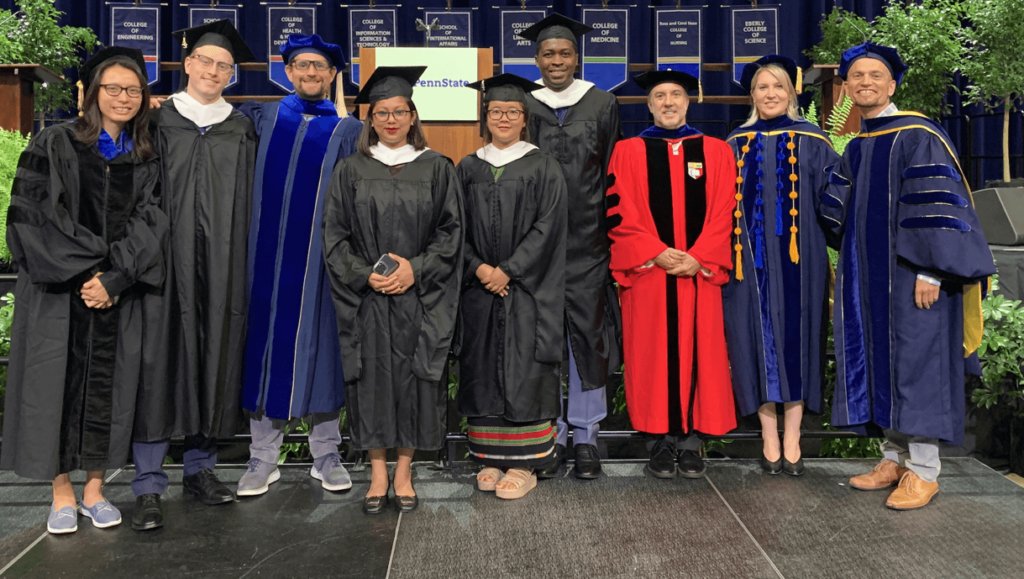
We are proud to welcome the tenth cohort of MPS students affiliated to our Labor and Global Workers’ Rights program!
The MPS program is designed for U.S. and international labor activists interested in labor rights, social justice, and global solidarity. It focuses on global workers’ rights, work and gender, race and migration, social movements, and labor relations systems around the world.
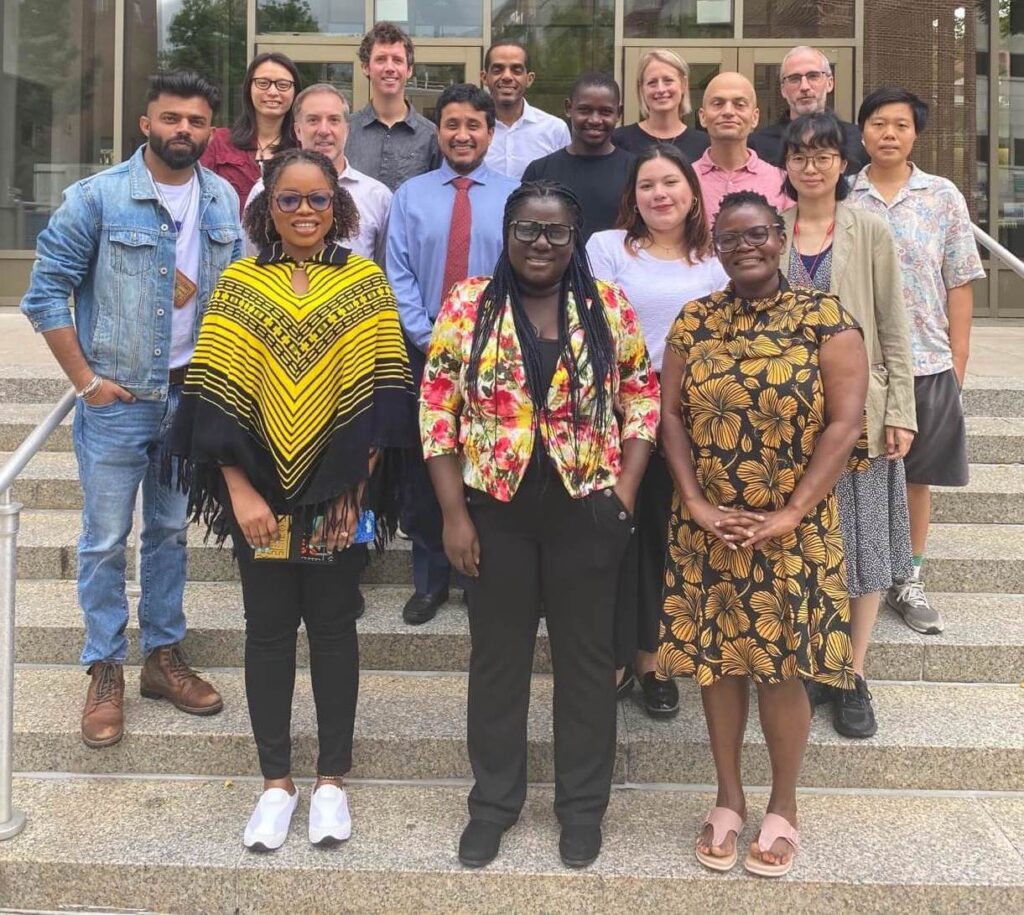
This academic year, the cohort will complete coursework on a broad range of labor issues around the informal and formal economies, gender and race at work, corporate research and campaigns, international and comparative employment relations systems, and comparative organizing models. During summer 2024, students will have the opportunity to participate in an internship with a labor organization and to complete a capstone research project. The program is part of the Global Labour University, a network of universities in five countries (Brazil, India, Germany, South Africa, and the United States), along with global union federations, national unions, and the International Labour Organization (ILO).
The new cohort consists of eight international students who bring a wealth of experience promoting labor rights across a range of geographic, industrial, and organizational contexts. The students hail from China, Ghana, Honduras, Kenya, and Pakistan.
Jiayi Yao (China)
Haoju Lu (China)
Abena Afriyie (Ghana)
Dorcas Owusua (Ghana)
Alejandra Flores (Honduras)
Paul Macharia (Kenya)
Mercy Nabwire (Kenya)
Muzammal Afzal (Kashmir/Pakistan/US)
Welcome one and all to the CGWR family!